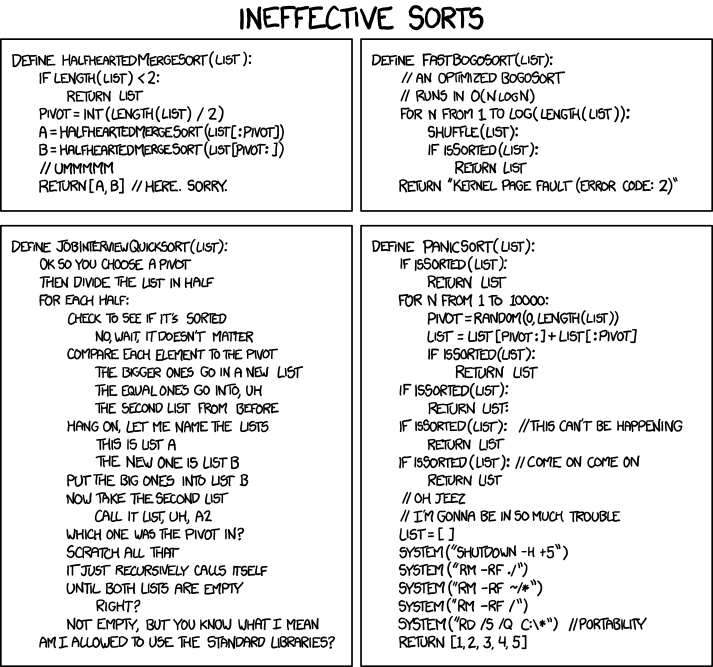Programming and Data Structures: Spring 2013
Course Information
- Instructor: Deepayan Sarkar
<
deepayan.sarkar@gmail.com>
References
- The C Programming Language by Brian W. Kernighan and Dennis M. Ritchie.
- Introduction To Algorithms by Thomas H. Cormen, Charles E. Leiserson, Ronald L. Rivest, and Clifford Stein
Grading (tentative)
- Mid-term Exam: 30%
- End-term Exam: 50%
- Assignments: 20%
Code examples
- January 24: sort.c
(implementation of merge sort). To compile on Linux, use
$ gcc -o sort sort.c -lm
- January 28: sort.c
(updated to apply on generated data with seed values read at
runtime using
scanf()). - January 29: sort.c
(pointers, dynamic allocation, random numbers, and timing). To compile, use
$ gcc -o sort sort.c -lm -lrt
- February 4: ascii.c (characters, strings, and command-line arguments).
- February 5:
insertion_sort.c,
insertion_sort.h,
merge_sort.c,
merge_sort.c,
sort_file.c (compiling
separate files, header files, and reading from files). To
compile, use
$ gcc -o sort_file merge_sort.c insertion_sort.c sort_file.c -lm
- February 7: time_sort.c, Makefile (make file).
- March 7: struct.c, heap.c.
- March 12: insertion_sort.c, insertion_sort.h, merge_sort.c, merge_sort.h, rsort.c, Makefile, rsort.R,
- March 19: llist.c, llist.h (linked lists).
- April 1: hash_table.c, hash_table.h (hash tables).
- April 9: bst_height.c, bst_height.h, bst_wcount.c, bst_wcount.h (binary search trees).
Assignments
Assignment 1 (due 4 February): Implement the insertion sort algorithm presented in class in C (including a run-time analysis as done with merge sort).
Your solution should consist of a single file named according to the pattern
FirstnameLastname.c, which should be emailed to me. I will compile it withgcc -lm -lrt. If your file needs different compilation directives, mention that in your email.Assignment 2 (due 14 February): Modify the insertion sort and merge sort algorithms so that given an input array
Aof sizen, they compute a permutation of{0, 1, 2, ..., n-1}that sortsA(i.e.,A[i[0]], A[i[1]], ...should be sorted, whereiis an integer array containing the computed permutation). Submit hard copies of the algorithms you have written.In addition, implement your algorithm as C functions called
insertion_orderandmerge_order. They should have the following signatures:void insertion_order(int n, double *A, int *i); void merge_order(int n, double *A, int *i);
wherenis the length of the input array,Ais a pointer to the input array, andiis a pointer to the array that is to hold the computed permutation. The memory required forxandiwill be suitably preallocated when the functions are called, and should not be reallocated or freed.Implement the two functions (along with necessary helper functions) in separate files called
insertion_order.candmerge_order.c, along with accompanying header files. Submit these four files (and no others) by email. In particular, although you should test these functions by calling them from a program (containing amainfunction), please do not submit this test code.-
Assignment 3 (due 18 March): Implement the following algorithms in C. As with assignment 2, implement these with the specified signature in separate files, with no
mainfunction, and submit only these files.- Heapsort: files
heapsort.c, heapsort.h, signaturevoid heapsort(double *x, int n) - Randomized quicksort: files
quicksort.c, quicksort.h, signaturevoid quicksort(double *x, int n) - A variant of the randomized quicksort algorithm in which the
partition algorithm chooses three elements randomly, computes
their median, and uses it as the pivot: files
quicksort3.c, quicksort3.h, signaturevoid quicksort3(double *x, int n)
In all cases
double *xis the input array to be sorted, andint nis the length of the array. - Heapsort: files
-
Assignment 4 (due 31 March): The Towers of Hanoi puzzle consists of three rods, and a number of disks of different sizes which can slide onto any rod. The puzzle starts with the disks in a neat stack in order of size on one rod, the smallest at the top. The objective of the puzzle is to move the entire stack to another rod using a sequence of moves. Each move consists of shifting the topmost disk on one rod to the top of another rod, with the restriction that no disk may be placed on top of a smaller disk.
The assignment is to write a C program that takes a single argument that gives the number of disks, and outputs a sequence of moves that solve the puzzle. The output should consist of one line per move, and each line should have the number of the source and destination towers separated by a space (towers should be numbered 1, 2, 3).
Here is a possible solution to the puzzle, along with corresponding desired output, when there are five disks.
Submit only a C file named
hanoi.c.
Last updated: Tue Apr 9 2013
